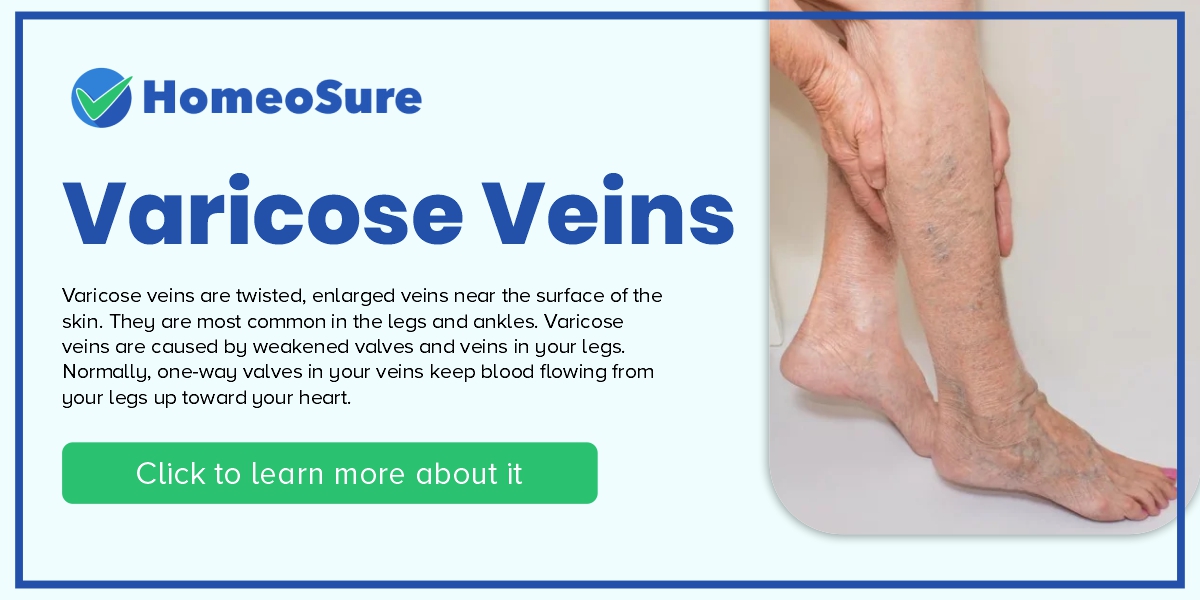Varicose Veins
Varicose veins are twisted, enlarged veins near the surface of the skin. They are most common in the legs and ankles. Varicose veins are caused by weakened valves and veins in your legs. Normally, one-way valves in your veins keep blood flowing from your legs up toward your heart.
When these valves do not work as they should, blood collects in your legs, and pressure builds up. The veins become weak, large, and twisted. Varicose veins are swollen and enlarged veins – usually blue or dark purple – that usually occur on the legs. They may also be lumpy, bulging or twisted in appearance.
CAUSES OF VARICOSE VEINS
- Weakened valves: If the valves don’t function properly, this can cause the blood to leak and flow backwards. If this happens, the blood will collect in your veins, which will become swollen and enlarged.
- Increased risk: A number of things can increase your likelihood of developing varicose veins, like
- Gender: Women are more likely to be affected by varicose veins than men. Research suggests this may be because female hormones tend to relax the walls of veins, making the valves more prone to leaking. Hormones are chemicals produced by the body, and changes may be caused by pregnancy, premenstrual syndrome or the menopause.
- Genetics: Your risk of developing varicose veins is increased if a close family member has the condition
- Age: As you get older, your veins start to lose their elasticity and the valves inside them stop working as well
- Being overweight: Being overweight puts extra pressure on your veins, which means they have to work harder to send the blood back to your heart. This can put increased pressure on the valves, making them more prone to leaking
- Occupation: Some research suggests jobs that require long periods of standing may increase your risk of getting varicose veins. This is because your blood does not flow as easily when you are standing for long periods of time
- Pregnancy: During pregnancy, the amount of blood increases to help support the developing baby. This puts extra strain on your veins
- Other conditions: In rare cases, varicose veins are caused by other conditions. These include:
- A previous blood clot
- A swelling or tumour in the pelvis
- Abnormal blood vessels
SYMPTOMS OF VARICOSE VEINS
- Heaviness, burning, aching, tiredness, or pain in your legs. Symptoms may be worse after you stand or sit for long periods of time.
- Swelling in your feet and ankles
- Itching over the vein
- More serious symptoms include:
- Leg swelling
- Swelling and calf pain after you sit or stand for long periods of time.
- Skin changes, such as:
- Colour changes
- Dry, thinned skin
- Inflammation
- Scaling
- Open sores, or you may bleed after a minor injury
COMPLICATIONS
Varicose Veins can complicate into:
- Inflammation: of the veins i.e. thrombophlebitis, causing swelling in the feet and ankles.
- Blood Clots: When the inflammation starts affecting the deeper veins of the legs, there could be sudden swelling in the legs.
- Skin Changes: Skin over the affected area just above the tortuous vein shows certain changes like inflammation, dryness, discolouration, eczema and even ulceration
MANAGEMENT OF VARICOSITIES
There are ways to ease symptoms of existing varicose veins, such as:
- Avoiding standing or sitting still for long periods and trying to move around every 30 minutes
- Taking regular breaks throughout the day, raising the legs on pillows while resting to ease discomfort
- Exercising regularly – this can improve circulation and help maintain a healthy weight
HOMEOPATHIC TREATMENT
Homeopathy works very well for mild to moderate cases of varicose veins. It helps to reduce pain, control further varicosity, reduces swelling. Homeopathy also helps significantly in the cases which have varicose ulcers. Homeopathic treatment is strongly recommended for all cases of varicose veins except for those which are truly surgical in nature.
